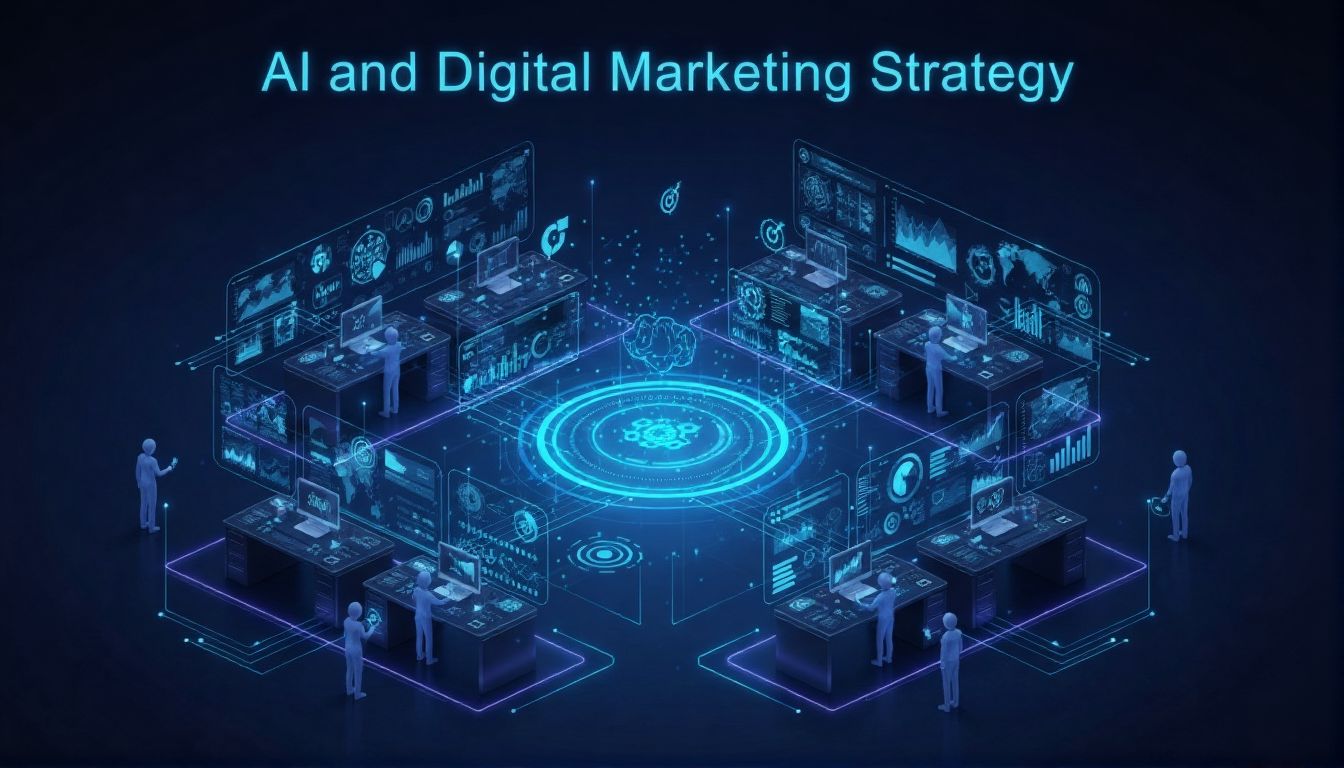The Ultimate Guide to Digital Marketing: Strategies, Tools, and Trends for 2025
Digital marketing has become the backbone of modern business growth. In today’s digital-first world, it’s nearly impossible to reach your target audience or grow your brand without a strong online presence. Whether you’re running a small business or a global brand, understanding the foundations of digital marketing is essential for staying competitive and relevant.

This comprehensive guide explores what digital marketing is, why it matters, and how various digital channels—like SEO, social media, and AI tools—are shaping the future of marketing in 2025 and beyond.
What Is Digital Marketing?
Digital marketing refers to promoting products, services, or brands using online channels such as search engines, social media, email, websites, and digital advertising. Unlike traditional marketing methods, digital marketing allows businesses to connect directly with their audience, track performance in real-time, and adjust strategies based on accurate data.
At its core, digital marketing focuses on visibility, engagement, and conversion. It’s not just about reaching people; it’s about reaching the right people with the right message at the right time.
Why Digital Marketing Is Essential for Business Growth
In an era where customers spend most of their time online, businesses that don’t invest in digital marketing risk being left behind. Some of the major advantages include:
Global Reach: Connect with audiences worldwide without geographic limitations.
Targeted Advertising: Use analytics and audience data to reach specific customer segments.
Measurable Results: Track every click, impression, and conversion in real-time.
Cost Efficiency: Compared to traditional advertising, digital marketing offers a higher ROI.
Core Components of Digital Marketing
Digital marketing is not a single strategy—it’s a combination of multiple elements working together. Below are the main pillars that define a successful digital marketing ecosystem.
1. Search Engine Optimization (SEO)
SEO is the process of optimizing your website so that it ranks higher on search engines like Google. This helps attract organic traffic and builds credibility for your brand.
A well-optimized website not only improves visibility but also enhances user experience and site speed—both critical factors in Google’s ranking algorithm.
To understand SEO in-depth and explore how professional SEO services can help your business grow, you can check out this detailed guide on SEO services. It breaks down how on-page and off-page optimization work together to improve rankings and generate consistent traffic.
2. Content Marketing
Content marketing revolves around creating valuable, informative, and engaging content to attract and retain your target audience. It includes blog posts, videos, infographics, podcasts, and eBooks.
The key to success in content marketing is relevance. Your content should address the audience’s pain points, answer their questions, and position your brand as an authority in your niche.
When done right, content marketing can drive organic traffic, boost SEO performance, and establish long-term brand loyalty.
3. Social Media Marketing
Social media marketing has transformed how brands connect with their audience. Platforms like Facebook, Instagram, LinkedIn, and X (Twitter) enable direct communication, community building, and brand storytelling.
Social media isn’t just about posting updates—it’s about engagement. Brands that consistently share valuable content, respond to followers, and maintain authenticity tend to build trust faster.
For a complete overview of social strategies and trends, explore this resource on social media marketing to learn how to create impactful campaigns that generate real results.
4. Pay-Per-Click (PPC) Advertising
PPC advertising allows businesses to display ads on search engines or social media platforms and pay only when users click on them. This model ensures cost control while offering instant visibility.
Google Ads and Meta Ads are among the most effective PPC platforms for driving quick leads and conversions. However, success depends on targeting, ad quality, and continuous campaign optimization.
5. Email Marketing
Email marketing remains one of the most reliable and ROI-friendly digital channels. Personalized email campaigns nurture leads, encourage repeat purchases, and maintain brand relationships.
Automation tools now make it easier to send behavior-based messages that align with customer needs—boosting engagement and conversion rates significantly.
6. AI and Automation in Digital Marketing
Artificial Intelligence (AI) has revolutionized the digital marketing landscape. From predictive analytics to chatbots and content generation, AI tools empower marketers to make smarter decisions and deliver personalized user experiences.
AI-driven tools can analyze massive amounts of data quickly, revealing trends that humans might miss. This enables more accurate targeting, better campaign management, and optimized ad spending.
To explore this exciting trend further, read more about AI and digital marketing innovations that are shaping how brands interact with audiences today.
How to Build an Effective Digital Marketing Strategy
A digital marketing strategy isn’t just a random mix of campaigns—it’s a structured approach designed to achieve specific goals.
Step 1: Define Clear Objectives
Start by identifying your goals—whether it’s increasing website traffic, generating leads, or building brand awareness. Your marketing plan should align with measurable KPIs (Key Performance Indicators).
Step 2: Understand Your Target Audience
Create detailed buyer personas that describe your ideal customers. Include demographics, interests, challenges, and online behavior patterns. The more you know your audience, the more effectively you can communicate with them.
Step 3: Choose the Right Channels
Not every platform suits every business. For instance, a B2B company may perform better on LinkedIn, while a fashion brand might thrive on Instagram or TikTok. Choose platforms that align with your audience and goals.

You can discover more about the full range of professional digital marketing solutions at Fast Digital 360’s services page, where each service is designed to meet unique business needs.
Step 4: Create Valuable and Consistent Content
Consistency builds trust. Post regularly, maintain quality, and ensure every piece of content aligns with your brand’s voice and message.
Incorporate visuals, videos, and interactive elements to keep your audience engaged. Remember: in digital marketing, attention is the most valuable currency.
Step 5: Track, Measure, and Optimize
Use analytics tools like Google Analytics, SEMrush, or Ahrefs to monitor your campaign performance. Adjust your strategies based on what works best. Data-driven marketing ensures continuous improvement and better ROI.
The Future of Digital Marketing
Digital marketing is continuously evolving, and staying updated is vital. Here are some trends shaping the industry in 2025:
AI-Powered Personalization: Hyper-targeted campaigns that adapt in real-time.
Voice and Visual Search: Optimizing content for voice assistants and visual tools.
Sustainability Marketing: Brands focusing on eco-friendly practices to connect emotionally with consumers.
Interactive Content: Quizzes, polls, and AR experiences are transforming engagement.
Businesses that embrace innovation and stay agile will continue to thrive in this competitive landscape.
How to Get Started with Professional Help
While it’s possible to handle some aspects of digital marketing yourself, working with experts can save time and accelerate results. Professional agencies bring expertise, advanced tools, and proven strategies that help you scale efficiently.
If you’re ready to elevate your digital presence, don’t hesitate to contact Fast Digital 360 for expert assistance. Their team can design a custom plan that fits your goals and budget.
Final Thoughts
Digital marketing isn’t just a trend—it’s a necessity for success in the modern business world. With the right mix of SEO, content marketing, social media, and AI tools, you can connect with your audience, build trust, and drive measurable growth.
By staying informed, adapting to new technologies, and leveraging expert guidance, your business can remain competitive in a rapidly changing digital landscape.
Whether you’re just starting or looking to scale, now is the perfect time to strengthen your digital marketing strategy and take your brand to the next level.